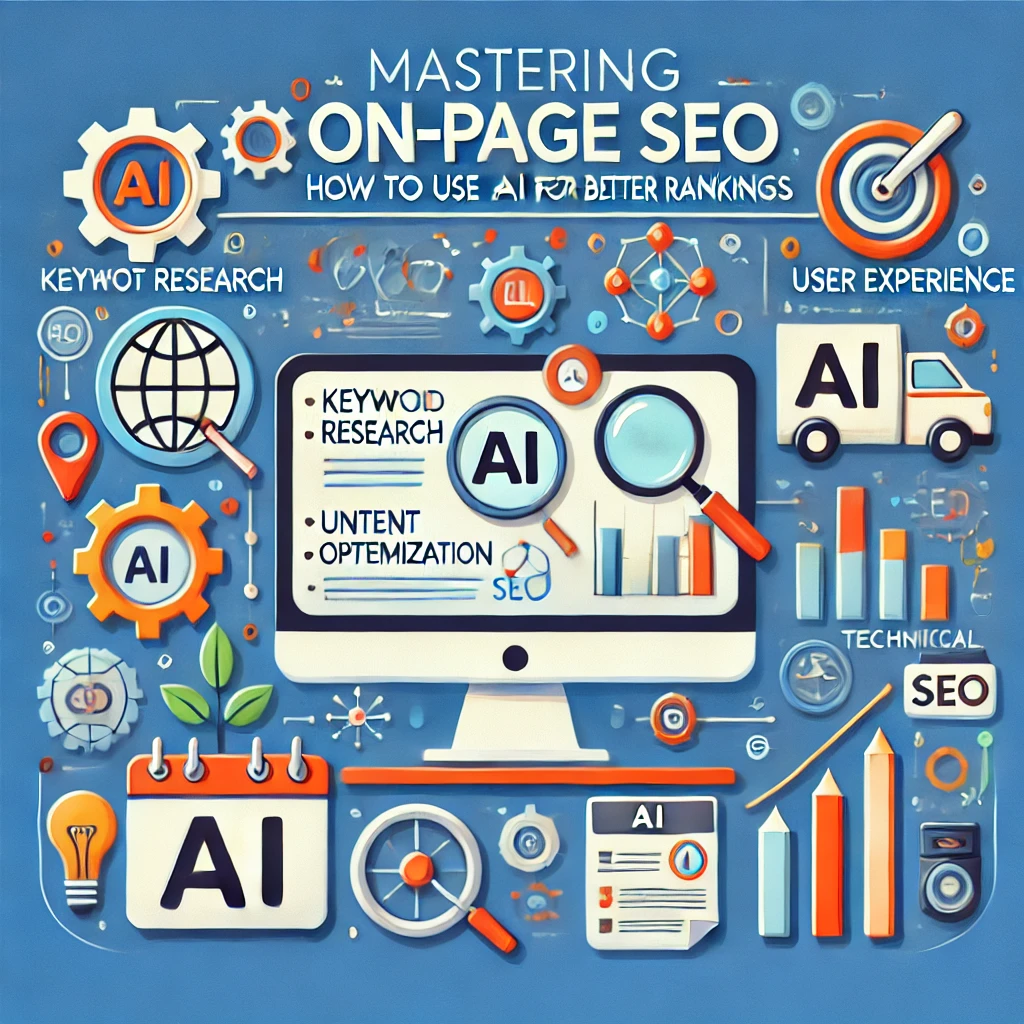In today’s digital world, staying competitive in search engine rankings is more challenging than ever. With Google and other search engines constantly evolving, staying up-to-date with SEO strategies is crucial for success. While traditional SEO practices like keyword research, content optimization, and link building remain relevant, one of the most powerful tools available today is artificial intelligence (AI).
At Bmarkify, we understand the importance of leveraging AI to stay ahead of the curve. In this post, we’ll dive deep into how to use AI for on-page SEO and explore the tools, techniques, and strategies that can help you optimize your content and improve your search engine rankings.
1. Understanding On-Page SEO and Its Importance
On-page SEO refers to all the activities you perform directly on your website to improve its ranking in search engine results pages (SERPs). These activities include optimizing content, improving website structure, enhancing user experience, and ensuring technical SEO elements like meta tags, header tags, and URLs are well-optimized.
When done right, on-page SEO helps search engines understand your content and determine its relevance to specific search queries. With AI for on-page SEO, you can automate and streamline many of these tasks, ensuring that you’re not only following best practices but also staying ahead of competitors.
2. How AI Enhances On-Page SEO
AI can be a game-changer when it comes to on-page SEO, offering capabilities that go beyond traditional manual methods. Here’s how AI can enhance on-page SEO:
a. Content Optimization
AI tools like GPT-3 (the technology behind platforms like ChatGPT) can analyze your content and provide suggestions for optimization. These tools can assess keyword usage, readability, tone, and engagement. By using AI for on-page SEO, you can ensure that your content is optimized for both search engines and users.
For example, AI can suggest keyword variations or related terms to include, ensuring your content is comprehensive and targeting the right audience. Additionally, AI-driven tools like Frase or Surfer SEO can analyze top-ranking pages on a specific topic and give recommendations on what to include in your content to improve its ranking.
b. Keyword Research and Placement
AI-powered tools are incredibly efficient at gathering insights from vast amounts of data. Traditional keyword research requires manually combing through search results, analyzing competitors, and looking for patterns. With AI, this process becomes automated, saving valuable time.
AI tools like Ahrefs and SEMrush use machine learning algorithms to analyze search trends and user intent, helping you discover the most effective keywords for your website. By understanding how people search and the language they use, AI helps you pick keywords that are more likely to bring traffic to your site.
Once you have your keywords, AI can assist with optimizing their placement. Tools like Surfer SEO use AI to ensure that your keywords are placed naturally throughout your content, titles, meta descriptions, and headings, helping to improve the relevance of your pages for search queries.
c. Content Generation and Suggestions
AI can also help with generating new content ideas based on current trends, search queries, and user intent. If you’re struggling to come up with blog post topics or need a content refresh, AI tools can suggest blog titles, outlines, and even full articles, providing a starting point that can be further refined.
Additionally, Bmarkify recommends using AI-driven content tools like Copy.ai or Jarvis to help create SEO-optimized content at scale. These tools can generate articles, product descriptions, and even social media posts with optimized keyword usage, saving time and ensuring your content stays relevant.
3. How to Use AI for On-Page SEO: Key Strategies
Now that we’ve covered the benefits of using AI for on-page SEO, let’s explore specific strategies you can implement to improve your rankings.
a. Improve User Experience (UX)
Google’s algorithms increasingly prioritize user experience as a ranking factor. AI can help improve the user experience on your website by analyzing user behavior and making recommendations for improvements. AI tools can analyze heatmaps, user clicks, scroll patterns, and session durations to help you identify problem areas on your site.
For example, tools like Hotjar and Crazy Egg use AI to track how users interact with your website, providing actionable insights to optimize your site’s layout, content, and navigation for better user engagement and retention.
b. AI-Driven Technical SEO Audits
Technical SEO is essential for ensuring that your website is easily crawled and indexed by search engines. AI can help automate the process of performing technical SEO audits, identifying issues such as broken links, slow loading speeds, missing meta tags, and duplicate content.
Tools like Screaming Frog SEO Spider and DeepCrawl use AI algorithms to perform comprehensive site audits, providing you with reports that outline specific technical SEO issues and recommendations for fixing them. This ensures that your site’s foundation is strong and ready to support your SEO efforts.
c. Optimize for Featured Snippets
Featured snippets are one of the most coveted positions in the search engine results pages, often providing immediate visibility to your website. AI can help you optimize your content to target these snippets by analyzing existing featured snippets for specific queries and providing recommendations for structure, format, and keyword usage.
AI-powered tools like Frase and MarketMuse can analyze top-ranking pages for your target keywords and suggest how to improve your content to capture featured snippets, including optimizing headings, using bullet points, and structuring your content in a question-and-answer format.
d. Content Scoring and Readability
One of the most important aspects of SEO is ensuring that your content is not only optimized for search engines but also readable and engaging for users. AI tools can analyze content for readability and structure, ensuring that it’s easy to understand and enjoyable to read.
AI-based platforms like Yoast SEO or Hemingway Editor provide content scoring systems that give feedback on readability, sentence structure, and overall content quality. This makes it easier to create content that both ranks well in search engines and appeals to your audience.
4. The Future of AI in On-Page SEO
As AI technology continues to evolve, its role in on-page SEO will only grow. AI will become even more adept at understanding context, analyzing user intent, and providing recommendations that go beyond traditional keyword optimization. As such, Bmarkify recommends embracing AI tools and strategies to ensure your website stays competitive in the ever-evolving SEO landscape.
5. Conclusion
Incorporating AI into your on-page SEO strategy can significantly improve your rankings and overall website performance. By utilizing AI for content optimization, keyword research, technical audits, user experience, and more, you can create a well-rounded, data-driven approach to SEO that saves time and delivers tangible results.
At Bmarkify, we specialize in helping businesses harness the power of AI to create SEO strategies that drive traffic, increase conversions, and improve search engine rankings. If you’re ready to take your on-page SEO to the next level, contact us today and start using AI for better rankings!




